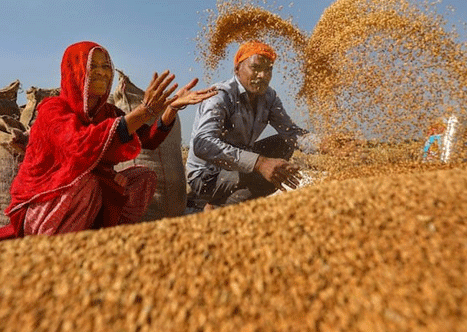Amidst rising wheat prices, the Indian government has taken proactive steps to stabilize the market and ensure adequate supply of wheat-based products like flour and biscuits. Recently, the Food Corporation of India (FCI) has been authorized to sell wheat from its reserves at a significantly discounted rate compared to current market prices, aiming to alleviate consumer burden and meet demand.
Market Dynamics and Government Strategy
In response to the current wheat price hike, the FCI will sell wheat at ₹23,250 per tonne under the Open Market Sale Scheme (OMSS), which is 12% lower than prevailing market rates. This move is expected to encourage private players and bulk consumers to procure wheat at reduced costs, thereby stabilizing prices in the retail market.
Last year, India witnessed a 6% increase in wheat prices, partly attributed to temperature fluctuations affecting crop yields in 2022 and 2023. In response, the government imposed restrictions on wheat exports in May 2022, which are still in effect. Despite challenges, wheat production for the current fiscal year is estimated at 112 million metric tonnes, reflecting a 6.24% decrease from projections. State warehouses currently hold 29.9 million metric tonnes of wheat, down from 31.5 million metric tonnes last year.
Impact on Market and Future Outlook
The recent government intervention, coupled with reduced domestic production, underscores the challenges faced by India’s wheat industry. By releasing wheat reserves at subsidized rates, the government aims to stabilize prices and prevent further inflationary pressure on essential food items. Additionally, with the imposition of stock limits on traders in June, the government aims to further curb speculation and ensure adequate supply in the market.
Looking ahead, the possibility of importing wheat from countries like Russia and Australia, subject to the removal of the current 40% import tax, remains a potential avenue to bolster domestic supply. This strategic approach seeks to balance consumer affordability with sustainable agricultural practices, ensuring food security amidst fluctuating global market conditions.
India’s proactive measures to address the wheat price hike through strategic release of reserves and import policies demonstrate a commitment to stabilizing food prices and ensuring accessibility for consumers. As the agricultural landscape evolves, continued governmental support and adaptive farming practices will be crucial in navigating future challenges and opportunities in the wheat sector.
Error




